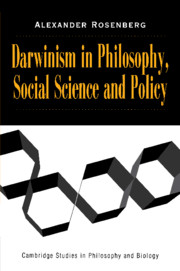Book contents
- Frontmatter
- Contents
- Introduction
- 1 A Field Guide to Recent Species of Naturalism
- 2 Naturalistic Epistemology for Eliminative Materialists
- 3 Limits to Biological Knowledge
- 4 Reductionism Redux: Computing the Embryo
- 5 What Happens to Genetics When Holism Runs Amok?
- 6 The Biological Justification of Ethics: A Best-Case Scenario
- 7 Moral Realism and Social Science
- 8 Contractarianism and the “Trolley” Problem
- 9 Does Evolutionary Theory Give Comfort or Inspiration to Economics?
- 10 The Political Philosophy of Biological Endowments: Some Considerations
- 11 Research Tactics and Economic Strategies: The Case of the Human Genome Project
- Bibliography
- Index
4 - Reductionism Redux: Computing the Embryo
Published online by Cambridge University Press: 06 July 2010
- Frontmatter
- Contents
- Introduction
- 1 A Field Guide to Recent Species of Naturalism
- 2 Naturalistic Epistemology for Eliminative Materialists
- 3 Limits to Biological Knowledge
- 4 Reductionism Redux: Computing the Embryo
- 5 What Happens to Genetics When Holism Runs Amok?
- 6 The Biological Justification of Ethics: A Best-Case Scenario
- 7 Moral Realism and Social Science
- 8 Contractarianism and the “Trolley” Problem
- 9 Does Evolutionary Theory Give Comfort or Inspiration to Economics?
- 10 The Political Philosophy of Biological Endowments: Some Considerations
- 11 Research Tactics and Economic Strategies: The Case of the Human Genome Project
- Bibliography
- Index
Summary
THE CONSENSUS ANTIREDUCTIONIST POSITION IN THE PHILOSOPHY OF BIOLOGY
The consensus antireductionist position in the philosophy of biology begins with a close study of the relationship of classical genetics (Mendelism and its successors), to the molecular biology of the nucleic acids, and their immediate protein products. This study reveals that there are in fact no laws of Mendelian genetics to be reduced to laws of molecular biology, and no distinctive laws in molecular biology to reduce laws of Mendelian genetics, that the kind terms of the two theories cannot be linked in general statements of manageable length that would systematically connect the two bodies of theory; and that nevertheless, biologists continue to accord explanatory power to Mendelian genetics, while accepting that Mendelian genes and their properties are “nothing but” nucleic acids and their properties.
The first three of these observations serve to completely undermine the thesis once held in the philosophy of biology that Mendelian genetics smoothly reduces to molecular genetics in accordance with some revision of the postpositivist account of reduction. The last two observations have been joined together as “physicalist antireductionism” – so called because it attempts to reconcile physicalism – the thesis that biological systems are nothing but physical systems, with antireductionism – the thesis that the complete truth about biological systems cannot be told in terms of physical science alone.
- Type
- Chapter
- Information
- Darwinism in Philosophy, Social Science and Policy , pp. 72 - 96Publisher: Cambridge University PressPrint publication year: 2000



